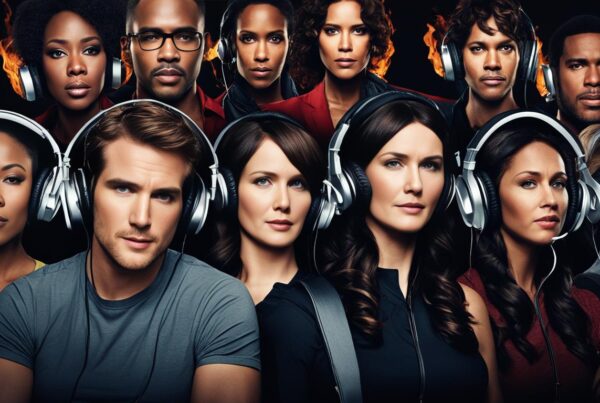If you’re a fan of audiobooks, be sure to add Suzanne Collins’ “Mockingjay” to your must-listen list! This captivating audiobook is the final installment in Collins’ acclaimed Hunger Games trilogy and is sure to leave you on the edge of your seat.
The audiobook review of “Mockingjay” highlights the compelling storytelling and thought-provoking themes that Collins is known for. In this article, we’ll delve into the plot and character development of the book, as well as providing an analysis of the quality of the narration and voice acting. We’ll also explore the pacing and suspense, the book’s themes and messages, and its critical reception and popular opinion. Not to mention highlighting the significant impact and legacy of “Mockingjay” in the literary world.
Whether you’re a fan of the earlier Hunger Games books or a newcomer, “Mockingjay” is an audiobook that you won’t want to miss. So, grab your headphones and join us on a thrilling, thought-provoking journey through the world of Panem!
Overview of “Mockingjay”
In “Mockingjay,” Suzanne Collins masterfully concludes the gripping narrative of Katniss Everdeen and the dystopian world of Panem that began in “The Hunger Games” and continued in “Catching Fire.” The book delves deeper into the themes of revolution, war, and sacrifice while also examining the characters’ complexities and journeys.
The story takes place in the aftermath of the Second Rebellion against the Capitol, in which Katniss and a group of rebels attempt to overthrow President Snow. Along the way, Katniss discovers shocking truths about her world and must make difficult choices that will impact the fate of her loved ones and the entire nation.
“Mockingjay” is impressive in its complexity and seamlessly wraps up the narrative in a satisfying and emotional conclusion.
The plot is full of twists and turns, keeping the reader on the edge of their seat until the final page. Collins’ writing is vivid and immersive, making the bleak and violent world of Panem feel all too real.
The Main Themes of “Mockingjay”
The themes of “Mockingjay” are powerful and thought-provoking, exploring the complexities of war, political power, and the human spirit. One of the main themes is the cost of revolution, as Katniss and the rebels must grapple with the consequences of their actions and the sacrifices they’ve made.
The book also delves into the idea of propaganda and how it can be used to manipulate people’s emotions and beliefs. The Capitol uses propaganda to maintain their power and control, while the rebels utilize it to inspire hope and rally support for their cause.
Another major theme is the toll of trauma and how it shapes a person’s identity and actions. Katniss and other characters struggle with the aftermath of their experiences, and the book explores how difficult it can be to move on from trauma in a world that won’t let you forget it.
Mockingjay Table: Main Events and Characters
| Main Events | Main Characters |
|---|---|
| Katniss agrees to become the “Mockingjay” for the rebels | Katniss Everdeen |
| The rebels launch an attack on the Capitol | Peeta Mellark |
| Katniss and her team infiltrate the Capitol to assassinate President Snow | Gale Hawthorne |
| Revelations about District 13’s involvement in the war | Finnick Odair |
| The final battle between the rebels and the Capitol forces | President Snow |
The characters of “Mockingjay” are as complex and multifaceted as the themes and plot. Katniss is a strong and resilient protagonist, but she also grapples with her own trauma and moral dilemmas. Peeta and Gale, her two love interests, represent two different sides of the revolution and how it affects the people of Panem.
Other characters such as Finnick, Johanna, and Beetee all have their own journeys and struggles in the war against the Capitol. President Snow, the main antagonist of the series, is a sinister and manipulative figure whose actions have far-reaching consequences for the characters and the world of Panem.
The next section will explore the character development in “Mockingjay” and how it contributes to the overall impact of the story.
Character Development in “Mockingjay”
In “Mockingjay,” Suzanne Collins delivers a stunning portrayal of character evolution and growth. The final book in the Hunger Games trilogy takes place in a dystopian world, where the stakes are high, and the characters are pushed to their limits. Through the intense conflicts and struggles, readers witness the main characters’ growth and development, making them feel more real and human.
Katniss Everdeen, the protagonist of the trilogy, undergoes significant character development in “Mockingjay.” She transforms from a reluctant participant in the Hunger Games to a symbol of hope and rebellion. The trauma and grief she experiences in the previous books push her towards a deeper understanding of herself and her values. As she becomes an active participant in the revolution, she faces tough choices that test her character and force her to reassess her beliefs.
Peeta Mellark, Katniss’ love interest, also undergoes significant character development in “Mockingjay.” As he is tormented by the Capitol and used as a tool for their propaganda, Peeta struggles to hold onto his own identity and convictions. His transformation from a gentle baker’s son to a weapon of war is both heartbreaking and thought-provoking.
The secondary characters in “Mockingjay” also experience growth and development, adding depth and complexity to the story. Johanna Mason and Finnick Odair, in particular, play significant roles in the revolution and undergo personal transformations that add to the book’s emotional impact.
“Mockingjay” expertly weaves complex themes and messages into its characters’ journeys, giving readers a captivating and thought-provoking experience.
Narration and Voice Acting
The narration and voice acting in the audiobook version of “Mockingjay” are a prime example of how a great story can be elevated by exceptional voice talent. The audiobook version, narrated by Carolyn McCormick, expertly captures the essence of each character, bringing them to life in a way that immerses listeners in the story.
The use of different voices for each character adds depth and dimension to the story, making it easier to distinguish between characters and follow the dialogue. McCormick’s narration effectively conveys the emotion and intensity of each scene, building suspense and creating a truly engaging listening experience.
The voices used for the mutts, a genetically engineered wolf-like animal, are particularly eerie and memorable. McCormick’s skillful narration of these sections sets them apart from the rest of the audiobook, creating a chilling and unforgettable experience for the listener.
“McCormick’s skillful narration of these sections sets them apart from the rest of the audiobook, creating a chilling and unforgettable experience for the listener.”
Pacing and Suspense
One of the most impressive features of the audiobook version of “Mockingjay” is its expert pacing and suspenseful storytelling. As the final installment of the Hunger Games trilogy, the stakes are higher than ever, and the audiobook ensures that listeners are fully immersed in the tension and drama of the story.
The audiobook version of “Mockingjay” keeps pace with the action-packed plot, ensuring that listeners never feel bored or disengaged. The story moves at a brisk pace, with each chapter building upon the last to create a sense of momentum that culminates in a thrilling finale. The audiobook is sure to keep listeners on the edge of their seats, eager to find out what happens next.
At the same time, the audiobook also masterfully builds suspense throughout the story. Whether it’s the looming threat of the Capitol or the tension between various characters, the audiobook keeps listeners guessing and anticipating what will happen next. The narration and voice acting only add to this sense of suspense, ensuring that each moment of the story feels alive and dynamic.

“The pacing and suspense in the audiobook version of ‘Mockingjay’ are truly expertly done. Every moment feels tense and engaging, making it a must-listen for fans of the Hunger Games trilogy.” – AudioFile Magazine
Themes and Messages in “Mockingjay”
Suzanne Collins weaves a complex web of social and political commentary throughout “Mockingjay,” exploring issues such as power, propaganda, and war. One of the most prominent themes in the book is the devastating impact of war on both individuals and society as a whole. Collins doesn’t shy away from depicting the brutal reality of violence, showing how it can tear families apart, cause irreparable damage, and perpetuate a vicious cycle of revenge.
Another important message in “Mockingjay” is the power of unity and shared values in overcoming oppression. The novel emphasizes the importance of collective action and the strength of standing together against a common enemy. Collins also explores the idea of identity and how it can be manipulated by external forces. Throughout the book, we see characters struggle to maintain their sense of self amidst the chaos of war and propaganda.
“It takes ten times as long to put yourself back together as it does to fall apart.”
Finally, “Mockingjay” is a commentary on the nature of power and the corrupting influence it can have on individuals and institutions. The Capitol’s obsession with control and domination is shown to be a destructive force that ultimately leads to its own downfall.
The haunting themes and messages in “Mockingjay” are as relevant today as they were when the book was first published. The novel serves as a cautionary tale about the dangers of unchecked power and the importance of standing up for what is right.
Comparison to Previous Books in the Trilogy
When compared to its predecessors, “The Hunger Games” and “Catching Fire,” “Mockingjay” moves away from the action-packed arena of the games and focuses more on the political themes of the rebellion. While the first two books were praised for their fast-paced and thrilling plots, some readers found “Mockingjay” to be slower and lacking in excitement. However, others appreciated the shift in focus and the deeper exploration of the consequences of war and trauma.
One notable difference between the books is the absence of the Hunger Games themselves in “Mockingjay.” While the games served as a central plot point in the previous books, they are only briefly mentioned in the final installment. Instead, the story revolves around the rebellion against the Capitol and the struggle for freedom.
Despite these differences, “Mockingjay” still contains the beloved characters that fans have grown to know and love. The audiobook version continues to portray their complexities and growth, with the talented voice actors bringing them to life.
Image depicting the covers of “The Hunger Games,” “Catching Fire,” and “Mockingjay,” the three books in the Hunger Games trilogy.
Critical Reception and Popular Opinion
Since its release, “Mockingjay” has received mixed reviews from critics and fans alike.
Critics applauded the book for its complex themes and thought-provoking commentary on war, politics, and society. However, some reviewers felt that the pacing and plotting were uneven, making the story feel disjointed at times. The audiobook version of “Mockingjay” has also garnered praise for its high-quality production value and immersive voice acting.
On the other hand, fans have had differing opinions on the final installment of the series. Some readers appreciated the dark and gritty conclusion to the trilogy, while others were disappointed by the bleak and often depressing tone of the book. Additionally, some fans felt that the ending failed to deliver a satisfying resolution to the story.
“Mockingjay delivers a powerful conclusion to the Hunger Games trilogy, grappling with mature themes and complex characters.” – The New York Times
| Positive Opinions | Negative Opinions |
|---|---|
| Thought-provoking commentary on society and politics | Uneven pacing and plotting |
| Emotionally impactful and immersive story | Bleak and depressing tone |
| Compelling character development | Disappointing ending |
Overall, while “Mockingjay” may not be everyone’s cup of tea, it remains a significant and impactful addition to the dystopian genre and the Hunger Games trilogy. Its critical reception and popular opinion speak to the enduring legacy of Suzanne Collins’ series and the impact it has had on readers and listeners alike.
Impact and Legacy of “Mockingjay”
Since its release in 2010, “Mockingjay” has left a lasting impact on the literary world, solidifying its place as a modern classic and a staple of the dystopian genre. The book’s powerful themes, complex characters, and thought-provoking commentary on politics and society continue to resonate with readers of all ages.
The impact of “Mockingjay” can be seen in the numerous adaptations and spin-offs it has spawned, including a successful film franchise and a prequel novel. The book’s influence has also extended to other areas of popular culture, inspiring fashion trends, music, and even political protest movements.
The legacy of “Mockingjay” is one of lasting significance, as it not only brought an epic story to a satisfying conclusion but also paved the way for a new generation of young adult literature. Suzanne Collins’ novel has set a high bar for future dystopian and sci-fi writers, challenging them to create complex worlds and relatable characters while pushing the boundaries of the genre.
“Mockingjay’s impact is immeasurable, not just for the success of its own story, but for how it has influenced and expanded the YA dystopian genre as a whole.”
– Book Riot
The enduring appeal of “Mockingjay” lies in its ability to explore deep and relevant themes while still captivating readers with its thrilling story and unforgettable characters. With its legacy firmly established, this powerful novel will continue to inspire and challenge readers for years to come.
Conclusion
To sum up, “Mockingjay” by Suzanne Collins is a thrilling audiobook that delivers a satisfying conclusion to the Hunger Games trilogy. The audiobook review has detailed the captivating plot, impressive character development, and thought-provoking themes that make this final installment a must-listen.
The quality of the narration and voice acting elevates the listening experience, while the pacing and suspense keep the audience engaged until the last moments. “Mockingjay” compares favorably to its predecessors, and it is clear from the critical reception and popular opinion that it has left a lasting impact and legacy in the literary world.
Whether you are a fan of the series or a newcomer, “Mockingjay” is a must-listen audiobook that will leave a lasting impression. So, don’t wait any longer, grab your headphones, and immerse yourself in the enthralling world of Panem.



